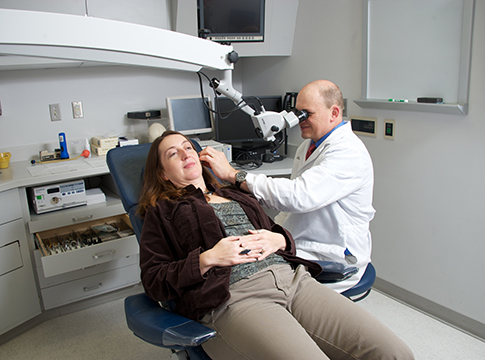Discovering the Area of Otolaryngology: What to Expect When You Seek Advice From an ENT
Otolaryngology, typically described as ENT, incorporates the medical diagnosis and therapy of throat, nose, and ear problems. For those experiencing associated concerns, getting in touch with an ENT specialist can offer clarity and relief. Recognizing what to expect during such consultations is essential for effective communication and care. This review will certainly describe vital facets of the ENT experience, consisting of typical reasons for sees and the processes included in diagnosis and treatment.

Comprehending Otolaryngology: A Summary
Otolaryngology, often referred to as ENT (Throat, ear, and nose) medication, is a specialized branch of medication that focuses on the diagnosis and therapy of problems affecting these vital locations of the body. This area includes a large range of conditions, including those related to hearing, equilibrium, respiratory feature, and speech. Otolaryngologists are educated to handle both medical and medical treatments, making use of advanced techniques and modern technologies. Their knowledge extends beyond standard conditions, dealing with issues such as allergies, sinus infections, and hearing loss. In addition, they play a critical function in the monitoring of head and neck cancers, offering extensive care tailored to individual patient requirements. In general, otolaryngology remains necessary for keeping health and quality of life in damaged people.
Typical Factors to See an ENT Professional
Lots of people look for the proficiency of an ENT expert for a range of reasons, showing the varied nature of problems that affect the nose, throat, and ear. Common issues consist of persistent sinusitis, which commonly causes persistent nasal congestion and face pain. Allergies and their connected signs, such as sneezing and itching, also trigger check outs to these professionals (Hearing). Hearing loss, whether gradual or abrupt, is an additional significant reason for assessment. In enhancement, people might look for analysis for throat conditions, consisting of relentless hoarseness or ingesting difficulties. Rest apnea, characterized by interrupted breathing during rest, is regularly addressed by ENT experts. Each of these problems highlights the importance of specialized treatment in taking care of complex ENT-related wellness issues
Preparing for Your ENT Visit
When planning for an ENT visit, it is vital to collect pertinent details and consider any kind of details issues. Individuals need to compile a thorough clinical background, including previous ear, nose, or throat concerns, surgical procedures, and existing medicines. Recording symptoms-- such as regularity, period, and seriousness-- can offer valuable insights for the ENT specialist. Additionally, individuals must prepare a listing of concerns they want to ask, making sure that all concerns are resolved throughout the visit. Bringing along any type of pertinent medical records or test outcomes can further help the ENT in comprehending the patient's problem. Finally, individuals ought to verify their consultation information, consisting of date, time, and location, to minimize any final confusion. Appropriate prep work can improve the performance of the consultation and bring about better results.
What to Anticipate Throughout the Assessment
As the examination starts, the person can expect to engage in a comprehensive discussion with the ENT specialist about their signs and symptoms and clinical history. The specialist will ask regarding the period, frequency, and severity of signs such as hearing loss, nasal congestion, or sore throat. In addition, the individual's previous clinical conditions, medications, and any kind of pertinent family background will certainly be reviewed, assisting the expert in creating a complete understanding of the person's wellness. The ENT might likewise inquire about way of living aspects, such as direct exposure to irritants or irritants. This open dialogue establishes a structure for the assessment, guaranteeing that the individual's concerns are attended to and setting the stage for any kind of necessary examinations or recommendations for therapy.
Analysis Examinations and Treatments in Otolaryngology
A variety of diagnostic examinations and treatments are essential in otolaryngology to accurately assess and identify conditions click this impacting the ear, throat, and nose. Typical examinations consist of audiometry, which determines hearing function, and tympanometry, examining middle ear stress. Nasal endoscopy enables visualization of the nasal flows and sinuses, while laryngoscopy checks out the throat and vocal cables. Imaging methods, such as CT scans and MRIs, provide detailed views of head and neck frameworks. Allergy testing may also be carried out to recognize triggers for sinus or respiratory issues. These analysis devices make it possible for ENT experts to develop an extensive understanding of clients' problems, making certain customized and effective administration strategies. Appropriate diagnosis is vital for successful therapy outcomes in otolaryngology.
Therapy Options Used by ENT Specialists
ENT professionals supply a range of treatment options customized to attend to certain conditions influencing the ear, throat, and nose. These treatments range from conventional strategies, such as drug and way of living modifications, to even more intrusive procedures. For circumstances, allergies might be managed with antihistamines or immunotherapy, while persistent sinusitis may call for nasal corticosteroids or sinus surgery. For hearing loss, ENT experts usually suggest hearing aids or medical interventions like cochlear implants. In situations of throat problems, alternatives can consist of speech therapy or surgeries to get rid of blockages. Additionally, they may give guidance for managing rest apnea, consisting of using CPAP gadgets or surgical treatments. In general, the objective is to boost individuals' lifestyle through customized treatment and efficient treatment techniques.
When to Look For Follow-Up Treatment With an ENT
When to seek follow-up care with an ENT specialist is vital for handling continuous signs and symptoms or difficulties related to ear, nose, and throat problems, acknowledging. Individuals should think about arranging a follow-up appointment if check it out signs and symptoms linger regardless of initial treatment, such as persistent ear pain, nasal blockage, or throat pain. Adjustments in hearing, equilibrium issues, or unusual nasal discharge might likewise call for further evaluation. In addition, if an individual experiences adverse effects from suggested medications or has undertaken a surgery, follow-up care is necessary to monitor recovery and attend to any kind of issues. Timely assessments can guarantee reliable administration of problems, protect against possible problems, and give satisfaction regarding one's wellness. Seeking follow-up care promotes aggressive health administration in otolaryngology.
Frequently Asked Inquiries

What Certifications Should I Seek in an ENT Professional?
When seeking an ENT professional, one need to try to find board accreditation, pertinent experience, and strong patient reviews. Furthermore, reliable communication skills and a caring approach can significantly enhance the general treatment experience.
Exactly how Do I Choose the Right ENT for My Demands?
Selecting the best ENT professional involves evaluating their credentials, experience, and patient testimonials (Otorrinolaringologia). It is necessary to contemplate their interaction style and technique to treatment, ensuring they align with the person's certain health requirements and preferences
Are There Any Type Of Threats Linked With ENT Procedures?
The dangers related to ENT treatments may include infection, blood loss, anesthesia difficulties, and possible damages to surrounding structures. Clients need to useful link talk about these risks with their doctor to understand private issues and guarantee informed decisions.
Exactly How Can I Take Care Of Anxiety Before My ENT Appointment?
To handle stress and anxiety before a consultation, individuals can practice deep breathing exercises, picture favorable outcomes, prepare questions beforehand, and seek support from close friends or household, promoting a feeling of confidence and peace.
What Should I Do if I Experience Negative Effects From Therapy?
If side effects from treatment occur, the person should quickly report them to their doctor. Adjustments to treatment or extra treatments may be essential to ensure safety and security and efficiency in managing their condition - Otolaryngologist. As the examination starts, the patient can expect to involve in a thorough conversation with the ENT expert regarding their signs and medical background. These analysis tools allow ENT specialists to establish a complete understanding of individuals' conditions, making sure customized and reliable monitoring plans. ENT specialists supply a range of treatment alternatives customized to resolve details conditions impacting the throat, nose, and ear. When looking for an ENT expert, one should look for board certification, relevant experience, and solid person testimonials. Picking the appropriate ENT professional involves examining their certifications, experience, and person evaluations
Comments on “ENT Surgery Explained: When Is It Recommended?”